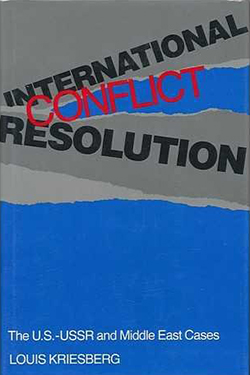International Conflict Resolution: The U.S.-USSR and Middle East Cases
Louis Kriesberg
Yale University Press, December 1992

As the cold war comes to an end, world attention focuses even more on tensions in the Middle East. This timely and important book examines both the American-Soviet and Arab-Israeli conflicts since 1948 and uses the history of their negotiations—one successful, the other less so—to establish principles that will be helpful in resolving international conflicts now and in the future. Written by an authority on conflict resolution, the book is the first to emphasize the entire process of peacemaking instead of just one of its aspects.
Examining the many de-escalation efforts in the U.S.-USSR and Arab-Israeli conflicts, Louis Kriesberg analyzes why initiatives are taken, why some initiatives are followed by negotiations and others are not, why some negotiations conclude in explicit agreements and others do not, and why some agreements become the basis for additional peacemaking moves and others do not even endure.
Applying insights from theories of conflict resolution and international relations, Kriesberg builds and tests a general theory of the process of conflict termination, deepening our understanding of specific efforts toward peacemaking and drawing inferences about de-escalation strategies for policy making. In an epilogue, Kriesberg discusses the war in the Persian Gulf and shows how its resolution illustrates the relevance of the insights he provides.